Evaluierung von Subventionsprogrammen
Diese Forschungsgruppe untersucht die Effekte von Produktions- und Wissensnetzwerken auf die Produktivität von Unternehmen und Regionen. Darüber hinaus werden Wirkungen staatlicher Förderprogramme für Forschung und Entwicklung sowie regionalpolitischer Programme auf die Leistungsfähigkeit von Unternehmen und Regionen evaluiert.
Zentrum für evidenzbasierte Politikberatung (IWH-CEP)
Forschungscluster
Wirtschaftliche Dynamik und StabilitätIhr Kontakt

Mitglied - Abteilung Präsidialbereich
PROJEKTE
09.2019 ‐ 09.2022
Etablierung einer evidenzbasierten Evaluationskultur für industriepolitische Fördermaßnahmen in Deutschland (EVA-KULT)
Europäischer Fonds für regionale Entwicklung (EFRE)
Das Vorhaben dient dem Ausbau des Zentrums für evidenzbasierte Politikberatung am Leibniz-Institut für Wirtschaftsforschung Halle (IWH-CEP).
01.2018 ‐ 12.2020
Vernetzt wachsen - Innovatives Sachsen-Anhalt durch digitale Geschäftsmodelle (Kompetenzzentrum 4.0)
Bundesministerium für Wirtschaft und Energie (BMWi)
01.2017 ‐ 12.2018
Politische Partizipation in Ostdeutschland
Bundesministerium für Wirtschaft und Energie (BMWi)
12.2015 ‐ 11.2018
Sozioökonomische Effekte der Erforschung innovativer Ansätze für die POC-Diagnostik
Bundesministerium für Bildung und Forschung (BMBF)
Teilvorhaben im Verbundprojekt “POC-Sensorplattform für chronisch-entzündliche Atemwegserkrankungen (EXASENS)”. Neun Leibniz-Institute arbeiten gemeinsam im Pilotprojekt EXASENS an der Erforschung einer Point-of-Care-Technologie zur Vorhersage und Diagnose von chronisch-entzündlichen Atemwegserkrankungen. Der Verbund wird vom Bundesministerium für Bildung und Forschung (BMBF) mit 6,25 Millionen Euro gefördert und liefert einen Beitrag zum Ausbau und zur Stärkung des Themenfeldes Gesundheitstechnologien.
Vgl. Pressemitteilung des Leibniz-Institut für Photonische Technologien (IPHT), Jena.
02.2017 ‐ 02.2018
Bedeutung außeruniversitärer Forschungseinrichtungen für die Entwicklung von Betrieben und Regionen
Bundesministerium für Bildung und Forschung (BMBF)
01.2015 ‐ 12.2016
Evaluierung der GRW-Förderung in Sachsen-Anhalt
Investitionsbank Sachsen-Anhalt
Referierte Publikationen
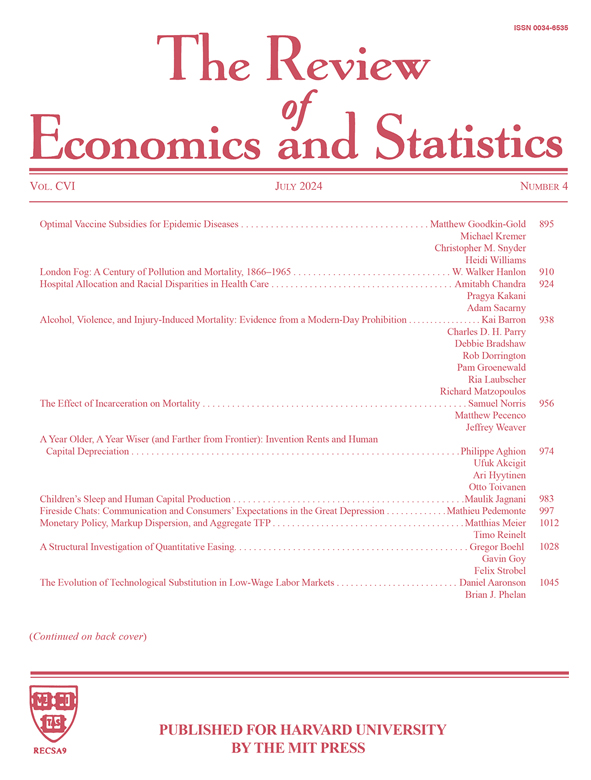
Professor Qualities and Student Achievement
in: Review of Economics and Statistics, Nr. 1, 2009
Abstract
This paper analyzes the importance of teacher quality at the college level. Instructors are matched to objective and subjective characteristics of teacher quality to estimate the impact of rank, salary, and perceived effectiveness on student performance and subject interest. Student and course fixed effects, time of day and week controls, and students' lack of knowledge about first-year instructors help minimize selection biases. Subjective teacher evaluations perform well in measuring instructor influences on students, while objective characteristics such as rank and salary do not. Overall, the importance of college instructor differences is small, but important outliers exist.
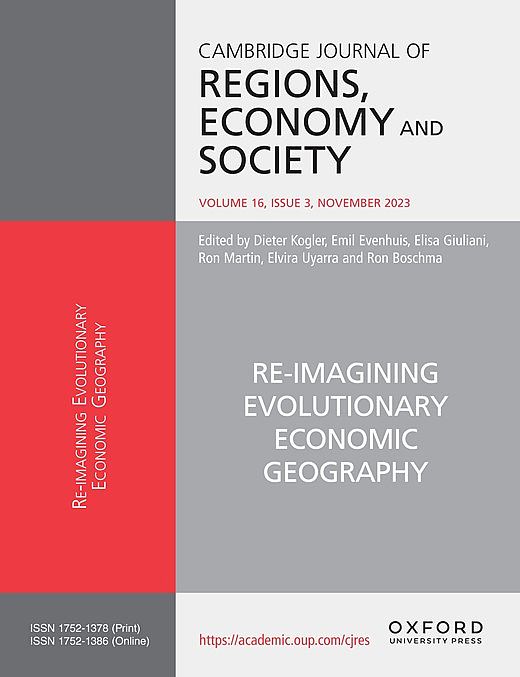
Are Rural Firms Left Behind? Firm Location and Perceived Job Attractiveness of High-skilled Workers
in: Cambridge Journal of Regions, Economy and Society, 2099
Abstract
We conduct a discrete choice experiment to investigate how the location of a firm in a rural or urban region affects the perceived job attractiveness for university students and graduates and, therewith, contributes to the rural–urban divide. We characterize the attractiveness of a location based on several dimensions (social life, public infrastructure and connectivity) and vary job design and contractual characteristics of the job. We find that job offers from companies in rural areas are generally considered less attractive, regardless of the attractiveness of the region. The negative perception is particularly pronounced among persons of urban origin and singles. In contrast, for individuals with partners and kids this preference is less pronounced. High-skilled individuals who originate from rural areas have no specific regional preference at all.
Arbeitspapiere
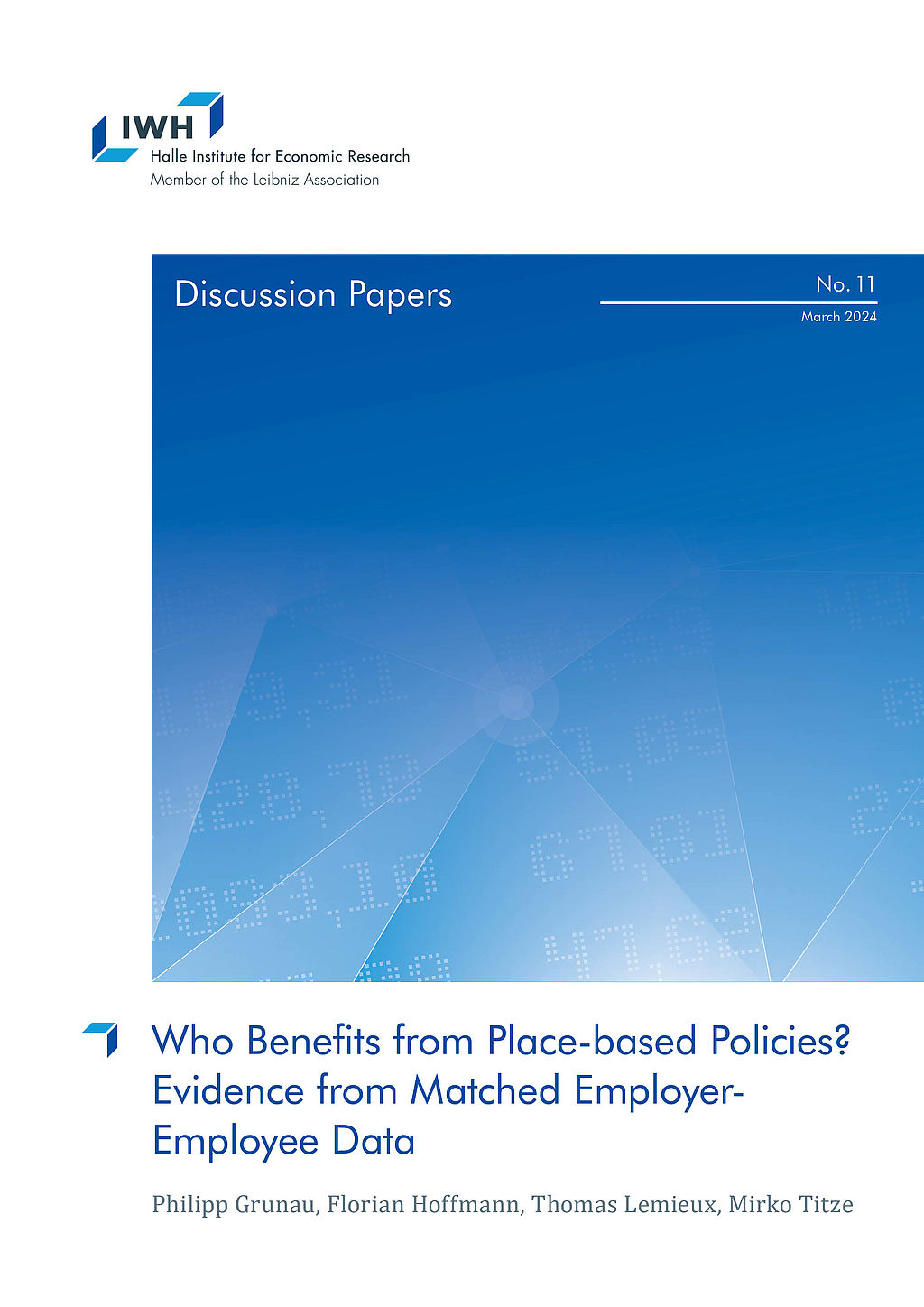
Who Benefits from Place-based Policies? Evidence from Matched Employer-Employee Data
in: IWH Discussion Papers, Nr. 11, 2024
Abstract
We study the wage and employment effects of a German place-based policy using a research design that exploits conditionally exogenous EU-wide rules governing the program parameters at the regional level. The place-based program subsidizes investments to create jobs with a subsidy rate that varies across labor market regions. The analysis uses matched data on the universe of establishments and their employees, establishment-level panel data on program participation, and regional scores that generate spatial discontinuities in program eligibility and generosity. These rich data enable us to study the incidence of the place-based program on different groups of individuals. We find that the program helps establishments create jobs that disproportionately benefit younger and less-educated workers. Funded establishments increase their wages but, unlike employment, wage gains do not persist in the long run. Employment effects estimated at the local area level are slightly larger than establishment-level estimates, suggesting limited spillover effects. Using subsidy rates as an instrumental variable for actual subsidies indicates that it costs approximately EUR 25,000 to create a new job in the economically disadvantaged areas targeted by the program.
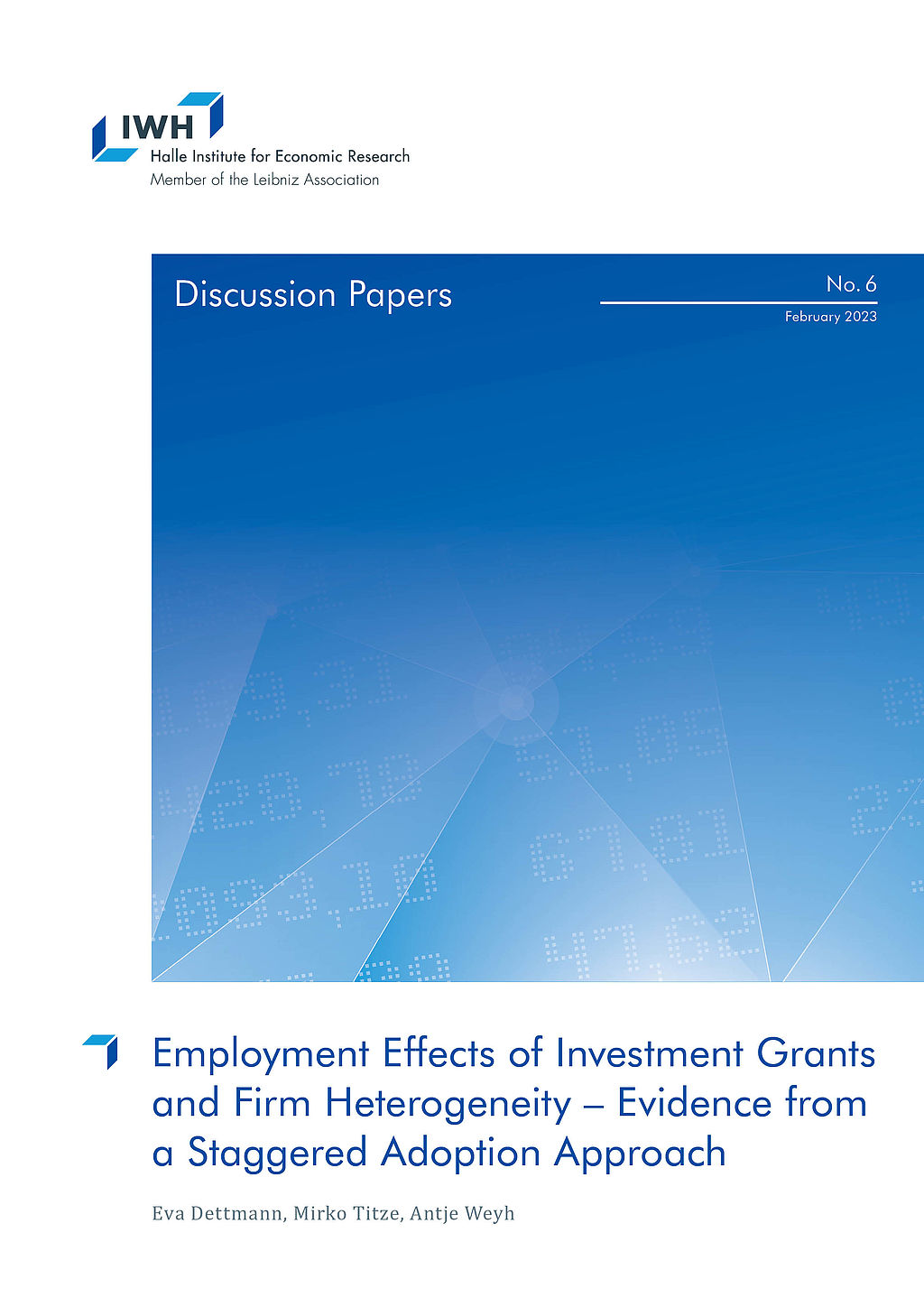
Employment Effects of Investment Grants and Firm Heterogeneity – Evidence from a Staggered Adoption Approach
in: IWH Discussion Papers, Nr. 6, 2023
Abstract
This study estimates the establishment-level employment effects of investment grants in Germany. In addition to the average treatment effect for the treated, we focus on discrimination in the funding rules as potential source of effect heterogeneity. We combine the difference-in-differences approach of Callaway and Sant’Anna (2021) that explicitly models variation in treatment timing with a ties matching at the cohort level. We observe a positive effect of investment grants on employment development in the full sample. The subsample analysis yields strong evidence for effect heterogeneity due to firm characteristics and the economic environment.
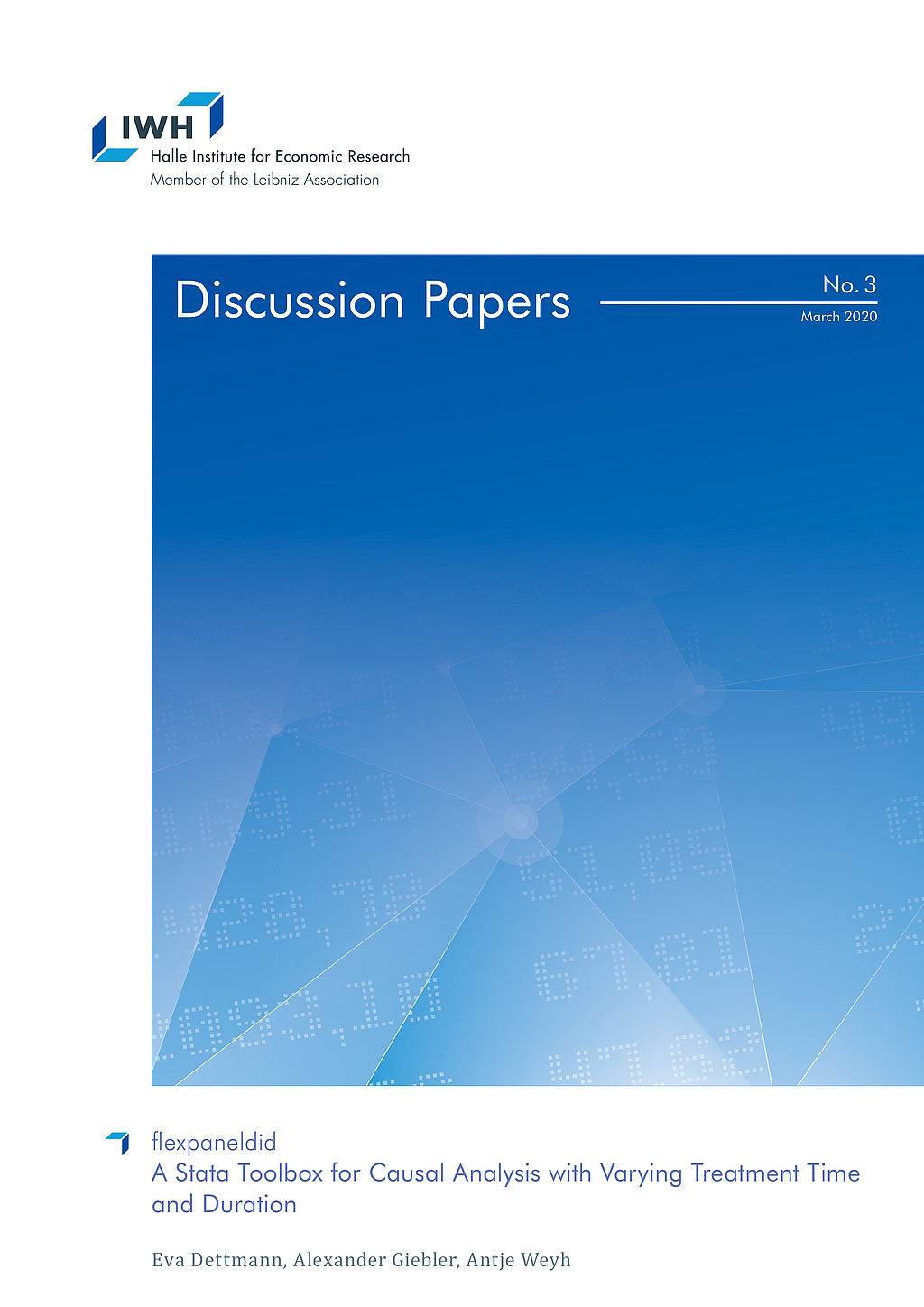
flexpaneldid: A Stata Toolbox for Causal Analysis with Varying Treatment Time and Duration
in: IWH Discussion Papers, Nr. 3, 2020
Abstract
The paper presents a modification of the matching and difference-in-differences approach of Heckman et al. (1998) for the staggered treatment adoption design and a Stata tool that implements the approach. This flexible conditional difference-in-differences approach is particularly useful for causal analysis of treatments with varying start dates and varying treatment durations. Introducing more flexibility enables the user to consider individual treatment periods for the treated observations and thus circumventing problems arising in canonical difference-in-differences approaches. The open-source flexpaneldid toolbox for Stata implements the developed approach and allows comprehensive robustness checks and quality tests. The core of the paper gives comprehensive examples to explain the use of the commands and its options on the basis of a publicly accessible data set.
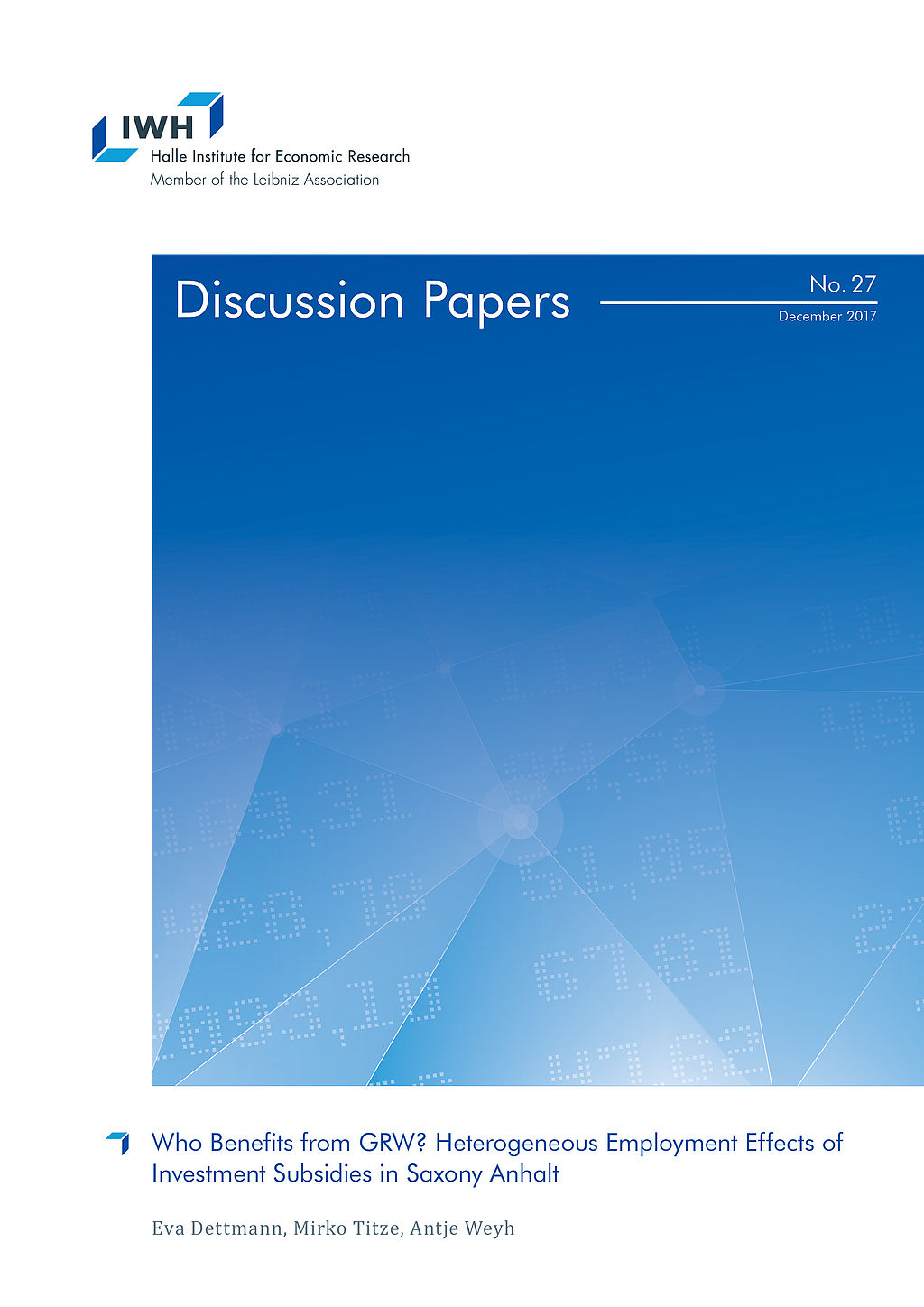
Who Benefits from GRW? Heterogeneous Employment Effects of Investment Subsidies in Saxony Anhalt
in: IWH Discussion Papers, Nr. 27, 2017
Abstract
The paper estimates the plant level employment effects of investment subsidies in one of the most strongly subsidized German Federal States. We analyze the treated plants as a whole, as well as the influence of heterogeneity in plant characteristics and the economic environment. Modifying the standard matching and difference-in-difference approach, we develop a new procedure that is particularly useful for the evaluation of funding programs with individual treatment phases within the funding period. Our data base combines treatment, employment and regional information from different sources. So, we can relate the absolute effects to the amount of the subsidy paid. The results suggest that investment subsidies have a positive influence on the employment development in absolute and standardized figures – with considerable effect heterogeneity.
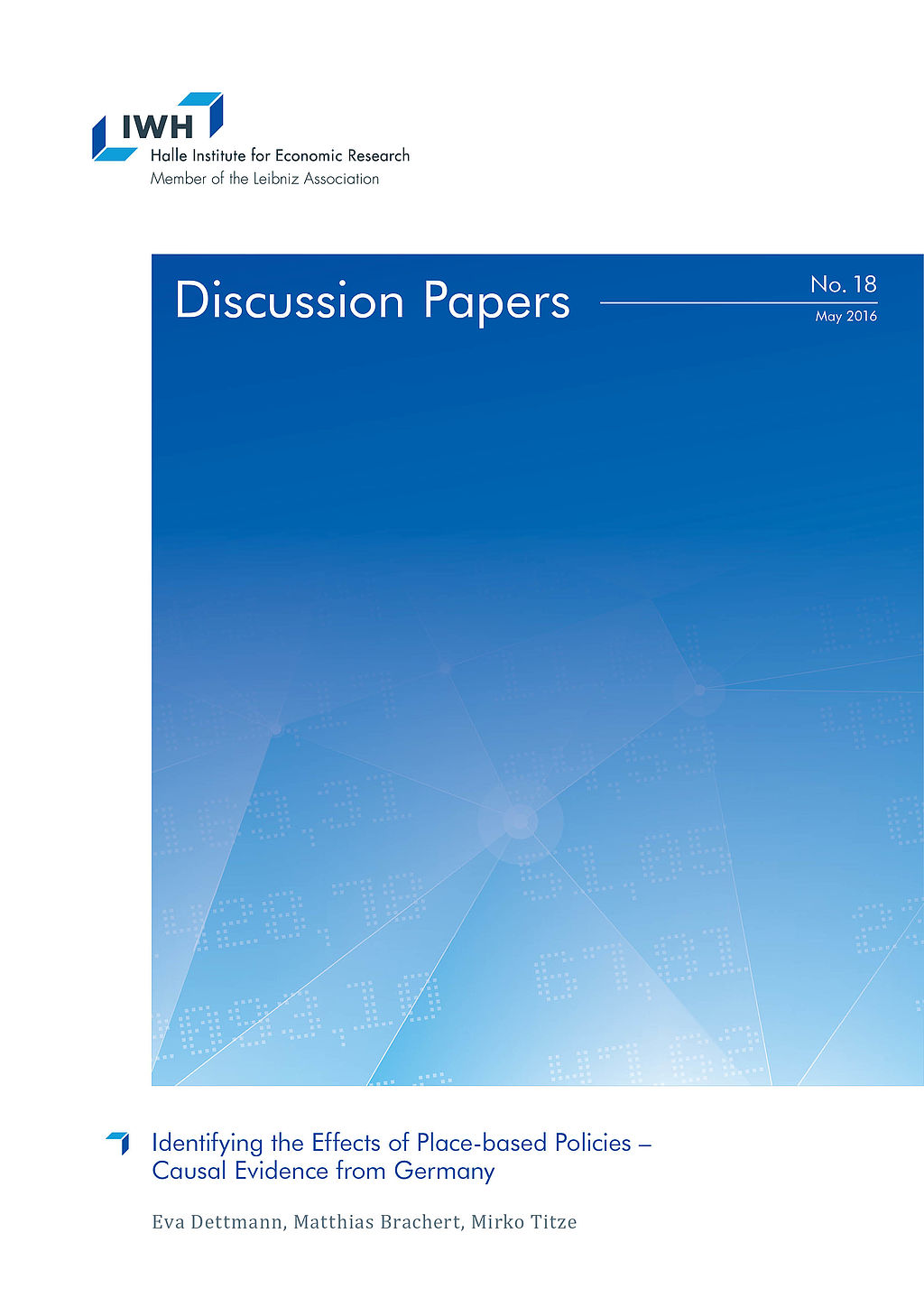
Identifying the Effects of Place-based Policies – Causal Evidence from Germany
in: IWH Discussion Papers, Nr. 18, 2016
Abstract
The German government provides discretionary investment grants to structurally weak regions to reduce regional disparities. We use a regression discontinuity design that exploits an exogenous discrete jump in the probability of receiving investment grants to identify the causal effects of the investment grant on regional outcomes. We find positive effects for regional gross value-added and productivity growth, but no effects for employment and gross wage growth.














